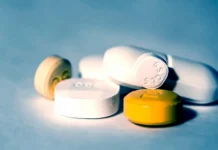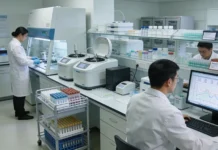The news is a remarkable turnaround for the drug, which had looked doomed to failure just a few months ago. In January this year, GlaxoSmithKline returned the rights to the drug following failure in Phase 3 trials.
But the company was offered an olive branch in July, the FDA declared that the drug could be considered approvable, based on surrogate endpoints.
The drug is one of a wave of new treatments which could provide a breakthrough in the fatal muscle-wasting disease which afflicts boys, usually resulting in their death before the age of 30.
Drisapersen uses a mechanism called ‘exon-skipping’ drug candidate, and has received “Fast Track status” from the FDA, making it eligible for a rolling review of an NDA. The drug was also granted “Breakthrough Therapy Designation” in June 2013.
The ‘rolling submission’ to the FDA is expected to be completed before the end of the year, and the company says it is also on track to submit a marketing authorisation application for conditional approval with the EMA in early 2015.
Hans Schikan, chief executive of Prosensa, said: “The commencement of the NDA submission for drisapersen is the culmination of over 12 years of work focused on making treatment options available for DMD patients globally, to improve the lives of boys with this devastating, debilitating childhood neuromuscular disease.
We have worked closely with patient groups, scientists, and clinicians throughout the development of our portfolio of six compounds for treating different DMD patient populations, and we pay tribute to everyone in the DMD community, in particular the boys and their families, who have helped us achieve this moment.
The FDA Safety and Innovation Act (FDASIA) of 2012 provides for an accelerated approval regulatory pathway which is designed to expedite the development and availability for drugs for serious conditions that fill an unmet medical need, based on whether the drug has an effect on a surrogate or an intermediate clinical endpoint which is reasonably likely to predict clinical benefit.
“To reach this pivotal point in Prosensa’s history, over 300 patients have participated in clinical studies of drisapersen at more than 50 trial sites in 25 countries, said Dr. Giles Campion, Prosensa’s Chief Medical Officer and Senior Vice-President R&D.”
Other companies in the field include Sarepta Therapeutics and its drug eteplirsen, as well as PTC Therapeutics’ and its candidate Translarna (ataluren). These companies have also experienced similar setbacks. The prospects of Translarna look positive, after having received a positive opinion on its application for conditional marketing in Europe.
Peak sales of drisapersen and its rivals could reach around $500 million, however this will depend on the true extent of benefits the treatments can offer DMD sufferers. While expectations of efficacy are limited, the highly proactive DMD patient advocate community are eager to see drugs launched to the market to offer hope and create a market for the rare condition, thereby encouraging further research investment.
┬Ā


















